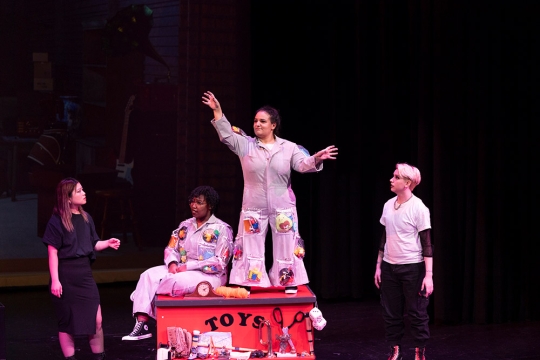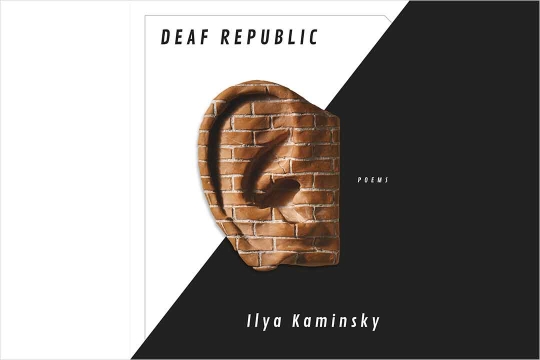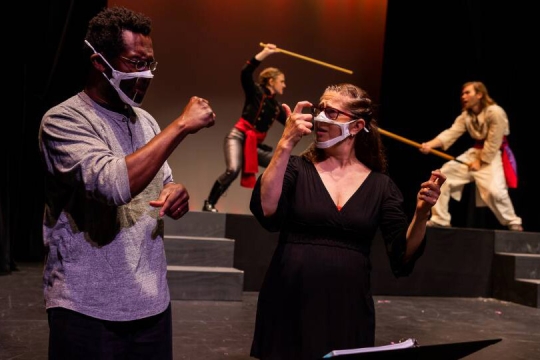
Jill Bradbury
Professor
Jill Bradbury
Professor
Bio
Jill Bradbury holds BA degrees in Economics and English from the University of California, Irvine; an MA in Economics from George Mason University; and an MA/PhD in English from Brown University. She has received multiple national, state, and regional grants to support Deaf and DeafBlind theater. These include grants from the National Endowment for the Arts for a bilingual production of Titus Andronicus, in collaboration with Play On Shakespeare, and for a 2023 Big Read focused on Ilya Kaminsky’s Deaf Republic. Bradbury also received a three year grant from the New York State Council on the Arts to support Protactile theater activities by/for the DeafBlind. She has served as project director for the DC stop of First Folio! The Book That Gave Us Shakespeare national traveling exhibition sponsored by the Folger Shakespeare Library (2016), for which she co-curated the exhibit, Shakespeare in American Deaf History. Publications include the collaborative essay "Protactile Shakespeare: Theater by/for the DeafBlind," Shakespeare Studies 47 (2019); “Audiences and ASL in Shakespeare Performance,” Shakespeare Bulletin 40.1 (2022); "Disability Embodiment and Inclusive Aesthetics," in Inclusive Shakespeares: Identity, Pedagogy, Performance (2023). With RIT colleague Andy Head, she co-authored Staging Deaf and Hearing Theatre: A Practical Guide (forthcoming Palgrave 2025). Her work has been featured in a Folger Shakespeare Library podcast on Shakespeare in Sign Language (2016) and in Humanities, the Magazine of the National Endowment for the Humanities (2021).
Select Scholarship
Publications
Monographs
Staging Deaf and Hearing Theatre: A Practical Guide. Co-authored with Andy Head. Forthcoming. Palgrave 2025.
Selected Journal Articles and Book Chapters
“Open Thy Deaf [Eyes]: Sound in ASL Shakespeare.” Forthcoming in The Cambridge Companion to Shakespeare and Sound, ed. Carla Della Gatta and Simon Smith. Cambridge, 2027.
“Deaf Actors and Shakespeare.” Forthcoming in The Idea of the Shakespearean Actor, ed. Sally Barnden, Emer McHugh, and Miranda Faye Thompson. Bloomsbury. 2025.
“Deaf Theater in the 21st Century: Directions and Dilemmas.” Forthcoming in Oxford Research Encyclopedia of Literature, ed. Sonya Loftis. Oxford, 2024.
“Disability Embodiment and Inclusive Aesthetics.” In Inclusive Shakespeares: Identity, Pedagogy, Performance, ed. Sonya Loftis, Mardy Philippian, and Justin P. Shaw. Palgrave, 2023.
“Audiences, American Sign Language, and Deafness in Shakespeare Performance.” Shakespeare Bulletin. 40.1 (2022): 45-67.
“Protactile Shakespeare: Inclusive Theater by/for the DeafBlind.” Primary author with NEA Art Works grant participants. Shakespeare Studies 47 (2019).
“Response to Robinson, Carol. ‘Go Ask Alisoun: Geoffrey Chaucer and Deafland (deafness as authority).’” Co-author. Literature Compass 15:6 (2018).
Grants
Research Grants in the Arts ($99,750) for Effectiveness and User Experience of Live Theater Captioning. National Endowment for the Arts. 2024-2026. Lead PI; Co-PI Janine Butler.
Support for Organizations ($148,500) for DeafBlind Performing Arts. New York State Council on the Arts. 2023-2026.
Rochester Area Community Foundation ($15,000) for Bilingual Titus Andronicus with Play On Shakespeare. National Endowment for the Arts. 2024.
Grants for Arts Recipient ($25,000) for Bilingual Titus Andronicus with Play On Shakespeare. National Endowment for the Arts. 2023.
Vitality Fund ($5,000) for Immersive Hamlet and DeafBlind Access. Rochester Area Community Foundation. 2023.
Theater Access Fund Plus ($5,000) for Performance Captioning. Theatre Development Fund. 2023.
NYSCA Regrant ($5,000) for Protactile Children’s Play Planning. Rochester Area Community Foundation. 2022.
Big Read Grant Recipient ($20,000) for Deaf Republic. National Endowment for the Arts. 2022.
Grants for Arts Recipient ($25,000) for Protactile Children’s Play. National Endowment for the Arts. 2022.
Covid-19 Relief Funding Grant Recipient ($218,000) for Deaf Performing Artists Master Class Series. National Technical Institute for the Deaf. 2021.
Anti-Racism Scholarship Grant Recipient ($15,000) for Anti-Racism in Deaf Theater Online Convening. National Technical Institute for the Deaf. 2021.
Art Works Grant Recipient ($25,000) for DeafBlind Theater Initiative. National Endowment for the Arts. 2017.
Other Significant Scholarly Work
Thy Name is Woman. Immersive stage adaptation of Hamlet, by William Shakespeare. Co-created with Andy Head and Alexa Scott-Flaherty. 2022-2023.
Project Director, Big Read: NTID. Funded by the National Endowment for the Arts' Big Read Initiative.April 2023.
Stage adaptation of Deaf Republic by Ilya Kaminsky. Produced at the National Technical Institute for the Deaf, Rochester Institute of Technology. April 2023.
Art, an Insurgency. Work Inspired by Deaf Republic. Exhibit co-curator with Pamela Kincheloe. Ohringer Gallery, Dyer Arts Center. National Technical Institute for the Deaf, Rochester Institute of Technology. April 2-28, 2023.
Protactile Shakespeare: Theater for the DeafBlind. Documentary film. Director, writer, and editor. Produced by Gallaudet Video Services. 2019. https://www.youtube.com/watch?v=btB_nePm860
Shakespeare in American Deaf History. Exhibit co-curator with Meredith Peruzzi. Jordan Art Gallery. Gallaudet University October 7-30, 2016.
Project Director, District of Columbia Host Site for First Folio! The Book That Gave Us Shakespeare Traveling Exhibition sponsored by Folger Shakespeare Library, American Library Association, and Cincinnati Museum Center. 2016.
Currently Teaching
In the News
-
June 6, 2023
![four actors on a stage, with two on top of a box labeled toys.]()
RIT/NTID and School of Performing Arts present 2023-2024 theatrical season
The 2023-2024 theatrical season featuring a partnership between RIT’s School of Performing Arts and NTID's Department of Performing Arts will include a celebration of Deaf rap and hip hop, an adaptation of Hamlet, a multimedia dance production, and several immersive theatrical performances, among others.
-
March 9, 2023
![book cover for Deaf Republic that shows an ear made out of bricks.]()
RIT/NTID to host 'Big Read'
Fox Rochester interviews Jill Bradbury, department chair of NTID's Department for Performing Arts, about National Deaf History Month and the Big Read community project.
-
August 23, 2022
![two people using sign language in the foreground and actors in a play on a stage in the background.]()
Found in translation: How ASL brings deeper meaning to Shakespeare
WGBH.org interviews Jill Bradbury, chair of NTID's Department of Performing Arts, about translating Shakespeare into sign language.


